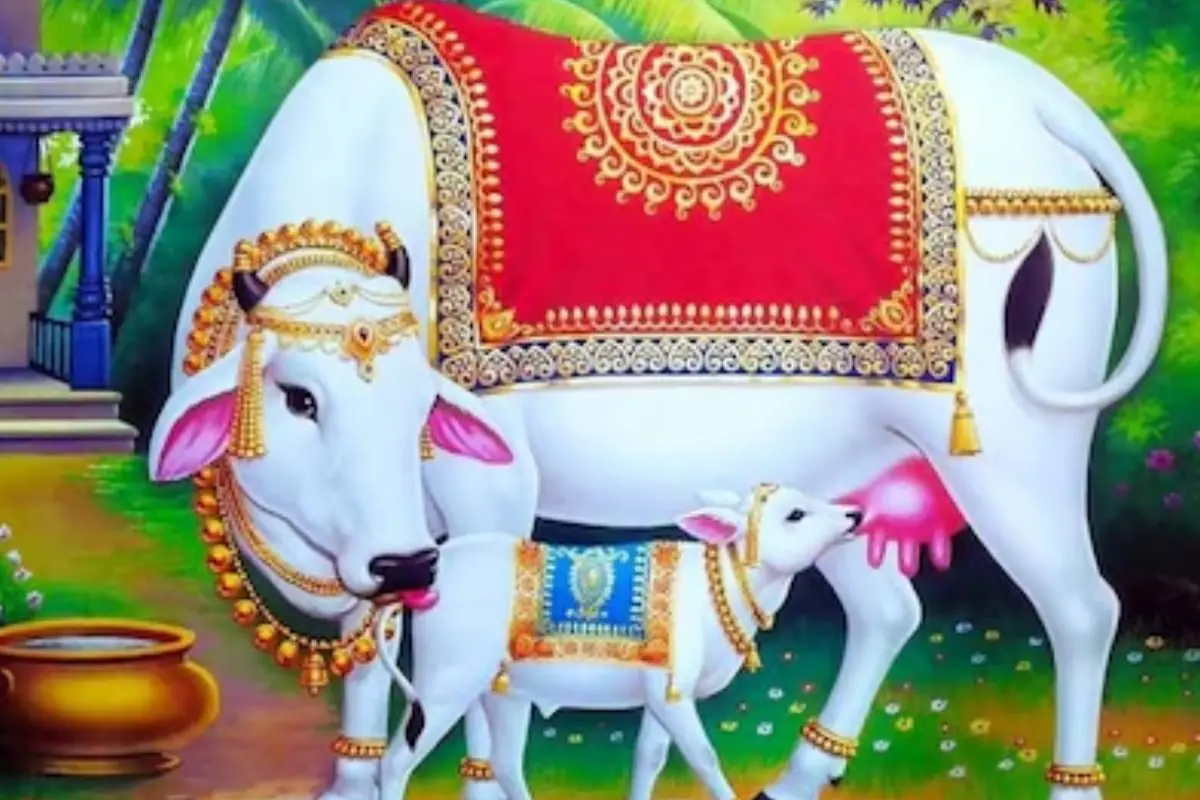Oct 17,2024

In Hinduism, cows hold a sacred status and are revered as a motherly figure. The tradition of worshipping cows has been observed for centuries, rooted in ancient texts and practices. A specific cow mentioned in the scriptures, Kamdhenu, is worshipped as a goddess. Devotees believe that worshipping Kamdhenu fulfils all their desires. Kamdhenu is known by various names in different texts, such as Surabhi, Nanda, Sunanda, Suman, Nandini, and Sushila. Kamdhenu is described as a completely white cow, believed to have emerged during the Samudra Manthan (churning of the ocean). During this cosmic event, in which gods and demons churned the ocean to obtain various treasures, Kamdhenu was one of the divine gifts. It is said that a loud sound accompanied her appearance, and when the gods and demons looked up, they saw Kamdhenu herself. The sages were entrusted with her care.
Kamdhenu’s worship is associated with prosperity and well-being. On Diwali, people bring an image or idol of Kamdhenu into their homes and worship her following the proper rituals. This is believed to bring happiness, remove diseases, and clear negative influences from the house, leading to peace and prosperity.
In certain stories, she is depicted with a woman’s head, further symbolising her divine and nurturing nature. Kamdhenu is often regarded as the mother of all cows, and her miraculous powers have been highlighted throughout various ancient texts.
After her birth, Kamdhenu performed many miracles. It is believed that whoever possessed Kamdhenu saw their wishes fulfilled and their tasks easily accomplished. Her divine presence brought fortune and success, attracting the admiration of both kings and sages. Her miraculous nature led people to worship her as a powerful deity capable of fulfilling all desires.
Here are some key aspects of the Kamdhenu cow in Hinduism:
Kamdhenu is also known as Surabhi: One of the many names used to refer to this divine cow.
Mother of all cows: Kamdhenu is regarded as the origin of all cows, symbolising nurture and abundance.
A gem from Samudra Manthan: Kamdhenu is considered one of the divine treasures that emerged during the churning of the ocean.
Resides in heaven: It is believed that Kamdhenu lives in the heavenly realms.
Abode of gods and goddesses: Many deities are believed to reside within Kamdhenu, enhancing her sacred status.
Legs symbolise the four Vedas: Kamdhenu’s four legs are seen as a representation of the four foundational texts of Hinduism — Rigveda, Yajurveda, Samaveda, and Atharvaveda.
Sun and Moon in her eyes: Kamdhenu’s eyes are believed to hold the Sun and Moon, symbolising her cosmic connection.
Symbol of wealth, happiness, and fortune: Kamdhenu represents prosperity, good luck, and joy.
Increasing wealth by keeping her idol: It is believed that having an idol of Kamdhenu in the home brings financial prosperity.
Worshipping Kamdhenu with her calf: This is seen as highly beneficial and is believed to enhance blessings.
North-east direction is ideal: Placing the idol of Kamdhenu in the north-east corner of the house is considered auspicious for wealth and well-being.
.svg)
